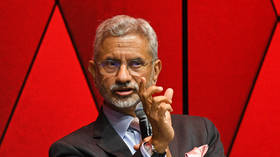Apple’s ‘secret’ $275 billion deal with China exposed
Apple CEO Tim Cook reportedly signed a “secret” $275 billion deal with Chinese authorities to bypass restrictions on his company’s operations, according to newly published internal documents.
Struck in 2016, the massive five-year agreement included a vow from Apple to boost the Chinese economy through investments and other business enterprises, according to a report by the Information on Tuesday, which is based on interviews with company insiders and Apple documents.
The deal was said to have been signed with China’s National Development and Reform Commission after Cook made several trips to the country, during a time when Apple faced a “series of regulatory actions” from the government that negatively impacted its business, the outlet reported, noting that officials in Beijing believed the company “wasn’t contributing enough to the local economy.”
Cook attempted to lobby the Chinese government throughout 2016, as it was implementing measures that would have damaged his company’s App Store, iCloud and Apple Pay systems, and which resulted in decreased iPhone sales for some time.
In addition to agreeing to set up a string of new retail locations, renewable energy initiatives and R&D centers across China, Cook purportedly pledged that his firm would work alongside Chinese academics and local manufacturers, and even buy components from suppliers in-country. In exchange for “necessary support and assistance” from the government, Apple would “grow together with Chinese enterprises to achieve mutual benefits and a win-win situation.”
Soon after the alleged deal, Apple publicly declared a $1 billion investment into a Chinese Uber competitor, Didi Chuxing, in May 2016, which Cook claimed would offer “a chance to learn more about certain segments of the China market.” The same year, it also announced a major deal with the country’s top wind turbine producer, Xinjiang Goldwind Science and Technology, and made plans to move iCloud operations over to China in 2017. A $300 million green energy fund was established by 2018, all seemingly in line with the five-year agreement.
Apple’s business in China appears to have recovered significantly since the regulatory crackdown in 2016, setting a quarterly revenue record of $68 billion there last summer while continuing to open new storefronts and research centers. China now makes up for about one-fifth of Apple’s total sales, according to the report.
READ MORE: Apple strikes back, taking Russia’s market regulator to court















